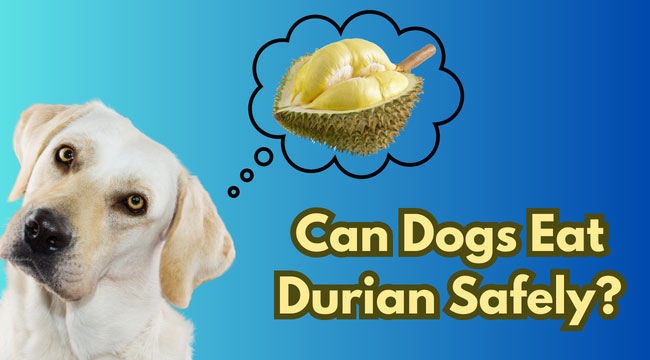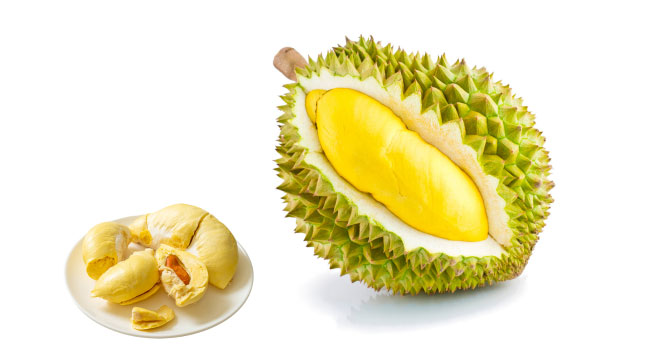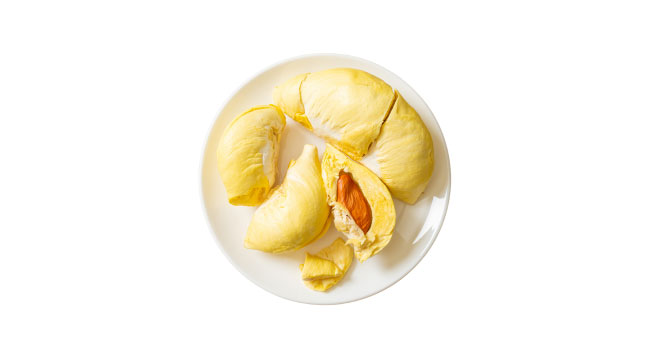
As a pet owner, you want to give your furry friend the best of everything, from toys and treats to love and affection. And when it comes to sharing your favorite foods, it’s no different. But while some human foods can be safely shared with dogs, others can be harmful or even toxic. When it comes to durian fruit, the short answer is yes; it can be shared with dogs, but only in very small amounts and with specific preparation.
It’s important to note that both the skin and the seeds are toxic for dogs, but both can be removed safely and easily. That said, it’s always best to consult with your veterinarian before introducing such foods to your dog to ensure their safety. In this article, we’ll explore the question, “Can dogs eat durian?” and provide you with the information you need to make an informed decision about sharing this unusual fruit with your furry companion.
Table of Contents
- What Is Durian?
- Can Dogs Eat Durian?
- Can Dogs Have Durian Safely?
- The Nutritional Benefits of Durian Fruit for Dogs
- Concerns to Keep in Mind
- How Much Durian is Safe for Your Dog to Eat?
- Can a Dog Be Allergic to Durian?
- How Can You Safely Share Durian Fruit with Your Dog?
- Conclusion
What Is Durian?

Durian is a highly unique and beloved fruit, known as the “king of fruits” in Southeast Asia, where it is native. This large and prickly fruit has a greenish-brown exterior and is known for its powerful and distinctive scent when ripe, which varies based on the type of durian.
While some individuals find the odor unpleasant, others appreciate it as part of the fruit’s charm. The flesh of a ripe durian is typically easy to extract, as the fruit often splits open on its own. However, if unripe, a large knife or cleaver is required to open the hard exterior.
The flesh inside comes in shades of white, yellow, or red and is appreciated by many for its creamy texture and unique flavor. It can be eaten raw or cooked and is often used in desserts or as a component in savory dishes. Due to its limited shelf-life and seasonal availability, durian can be relatively expensive, especially when imported.
Durian grows in tropical regions around the globe, but it is most commonly found in Southeast Asian countries such as Malaysia, Indonesia, and Thailand. The fruit can reach up to 1 foot (30 cm) in length and 6 inches (15 cm) in width, with the typical fruit containing roughly 2 cups (486 grams) of edible pulp.
Can Dogs Eat Durian?
Dogs can eat durian, but it is important to be cautious of the seed. Like most seeds, the durian seed contains cyanide, which can be dangerous and potentially fatal to animals. Cyanide can harm a dog’s heart and brain, leading to serious health issues and even death. The effect of durian seeds on dogs is similar to the dangerous effects of cherry leaves and seeds, which also contain cyanide and are toxic to dogs.
Signs of cyanide poisoning in dogs include rapid and heavy breathing, skin problems, cardiac arrhythmia, dizziness, and other health issues. While there is no definitive proof that durians are entirely safe or unsafe for dogs to consume, it is important to avoid feeding dogs durian seeds to prevent any potential harm to their health.
While it’s natural to want to give our furry friends a special treat or satisfy our curiosity by offering them a few slices of durian, it’s important to remember that dogs are delicate creatures that require special care. Therefore, it’s important to avoid feeding them anything that could potentially harm their health. In conclusion, while dogs can eat durian, it’s crucial to exercise caution and avoid giving them any part of the fruit that could be toxic or harmful to their health.
Related Post: Can Dogs Eat Cheerios? Safe or Risky Snacking?
Can Dogs Have Durian Safely?
Durian fruit, a popular delicacy in Southeast Asia, is known for its many health benefits. While it may not be suitable for all breeds of dogs, certain breeds or dogs with specific ailments can benefit from its properties. For example, if your dog has trouble maintaining a healthy weight or needs to gain weight, durian fruit is a great option. It is a high-fat, high-calorie fruit of the healthy and natural kind, making it an excellent supplement for dogs. However, before introducing it to your dog’s diet, it is crucial to consult a veterinarian.
If your dog has weight issues or is prone to obesity, durian fruit may not be the best choice. However, as an occasional treat, it can be a healthy one, packed with essential vitamins and minerals like vitamins A and C, B6, calcium, iron, zinc, magnesium, phosphorus, and more. In the grand scheme of things, there are certainly worse treats you could give your furry friend.
Related Post: Can Dogs Eat Tuna?
The Nutritional Benefits of Durian Fruit for Dogs
If you’re looking for a healthy and nutrient-packed treat for your furry friend, consider giving them some durian fruit. Durian is known as a superfruit due to its high level of essential vitamins and minerals, including vitamin C, folic acid, riboflavin, thiamin, niacin, vitamin A, potassium, iron, and calcium. Not only is it a great source of nutrition, but it’s also high in healthy fats, which can help dogs retain calories for long working or playing sessions.
Like avocado, durian fruit is rich in soluble fiber, which contributes to overall positive gut health. If your dog is struggling with a fiber deficiency or GI tract issues, adding durian to their diet could be a healthy and natural way to help.
Durian fruit also contains antioxidants, which can neutralize free radicals in your pup’s body that may cause illnesses and cancer. Additionally, certain compounds found in the fruit can help prevent atherosclerosis and reduce the risk of heart disease.
However, it’s important to remember that while durian fruit can have many health benefits for your dog, it should always be given in moderation and with caution. It’s best to consult with your veterinarian before introducing any new food into your dog’s diet.
Related Post: Can Dogs Eat Acai? Exploring the Safety and Benefits
Concerns to Keep in Mind
While it’s generally safe for dogs to consume the flesh of the durian fruit, there are important considerations you should keep in mind to ensure your furry friend can enjoy this exotic treat without any harm.
Firstly, it’s crucial to avoid giving your dog the spiky and hard outer rind of the fruit, as it can pose a choking hazard or cause injury to their mouth or throat. It’s equally important to keep the durian seeds, stems, and leaves away from your pet, as they contain cyanide, which can be deadly if ingested.
Additionally, the stem, leaves, and seeds can also cause intestinal blockages in dogs, so it’s vital to remove them before offering the fruit to your pet.
When it comes to portion size, moderation is key. While durian fruit is nutrient-dense and beneficial in small quantities, overfeeding can lead to digestive upset, including diarrhea and vomiting. To determine the appropriate serving size for your dog, consult with your veterinarian, who can take into account your pet’s size, weight, and overall health.
Related Post: Can Dogs Eat Couscous? How Much Is Safe?
How Much Durian is Safe for Your Dog to Eat?

Limiting your dog’s durian portions is crucial for three reasons. Firstly, like other fruits, durian is rich in natural sugars. Consuming too much sugar can lead to unhealthy spikes in blood sugar levels and even cause diabetes. Hence, it is essential to ensure that your dog does not overindulge in sugary foods. Secondly, besides significant sugar content, durian is surprisingly high in fat. Overfeeding your dog with fatty foods can result in unwanted weight gain. Therefore, if you feed your dog sugary and fatty foods all day long, it could lead to obesity. However, if your dog is underweight, giving them a small amount of durian treats could help them gain some weight.
Thirdly, another crucial point to consider is the impact of durian on cardiovascular health. According to a study, the effect of durian on cardiovascular health remains controversial. While both systolic and diastolic blood pressure remained normal for groups given durian, a significant increase in heart rate was observed in the group that consumed 500g of durian at 0.5-2 hours. Therefore, feeding your dog with a large amount of durian fruit could speed up their heart rate. It is conceivable that this effect could be observable across species, and it is essential to feed your dog only small quantities of durian. Thus, durian fruit is appropriate as a treat but not as a meal.
You may know that no more than 10% of the calories your dog consumes each day should come from treats and snacks. However, it is essential to note that 10% of your dog’s calories should not come from durian. Consuming too much fat and sugar could lead to health issues in your dog. Therefore, it is best to feed your dog only a few bites of durian per serving, not exceeding a couple of times a week.
Related Post: Can Dogs Eat Durian Safely?
Can a Dog Be Allergic to Durian?
Yes, it is possible for dogs to be allergic to durian. Durian is a fruit that contains several allergenic proteins that can cause allergic reactions in both humans and animals. While durian is not a common allergen for dogs, some dogs may be sensitive to it.
Here are some tips to help you understand if your dog is reacting poorly to durian fruit:
- While durian is not toxic for dogs, it may be difficult for them to digest or may cause changes in their behavior or energy levels.
- Monitor your dog closely for signs of discomfort or illness after feeding them durian fruit.
- Overfeeding your dog durian fruit may cause them to become overly energetic and hyperactive.
- Signs that your dog may not be able to tolerate durian fruit include vomiting, laziness, tiredness, diarrhea, loose or bloody stool, or constipation.
- If your dog has consumed too much durian, it may experience abdominal bloating, cramps, weakness, fatigue, lethargy, vomiting, and other digestive issues.
- Be aware that fruit seeds, including those in durian, can contain trace amounts of cyanide and may cause serious illness or death if consumed in large quantities.
- Watch for body language signs such as whining, panting, weakness, whimpering, dilated pupils, ears up, and sleepiness that may indicate your dog is not feeling well after consuming durian.
- Other signs to look out for include bursts of energy, shock, rapid breathing, loose stool or diarrhea, vomiting, lethargy, and sugar crashes.
If you suspect that your dog may be allergic to durian, it is important to take them to a veterinarian as soon as possible. A vet can perform allergy testing to determine the exact cause of your dog’s symptoms and develop a treatment plan to manage their allergy.
Related Post: Can Dogs Eat Funyuns?
How Can You Safely Share Durian Fruit with Your Dog?
Preparing durian fruit for your furry friend requires some caution, but it’s not too difficult, and it’s similar to how humans prepare the fruit for themselves.
The creamy and delicious flesh of the durian fruit is found inside the hard and spiky exterior. However, the flesh contains seeds that are toxic to dogs because of the cyanide they contain. The good news is that the seeds are relatively large and easy to remove, similar to how one would remove the pit of an avocado.
To make durian fruit safe for your dog to eat, simply remove the outer shell, seeds, and all leaves and stems. However, it’s important to consult with your veterinarian before trying out durian fruit with your dog. Additionally, be sure to monitor your furry friend closely to ensure they have no adverse reactions.
Related Post: Can Your Dog Eat Onions? Here’s Why You Should Avoid It
Conclusion
The decision of whether to feed your dog durian is ultimately yours to make. If you don’t mind the pungent odor and enjoy the taste, sharing some durian with your furry friend can be a safe and enjoyable treat. Giving your dog durian in moderation is safe and won’t cause any harm.
Nonetheless, it’s crucial to take precautionary measures and ensure that your dog doesn’t consume the seeds or rind of the fruit. Swallowing the seeds can result in internal damage while mishandling the rind can lead to injury. Therefore, it’s essential to remove these parts of the fruit before giving it to your dog.



